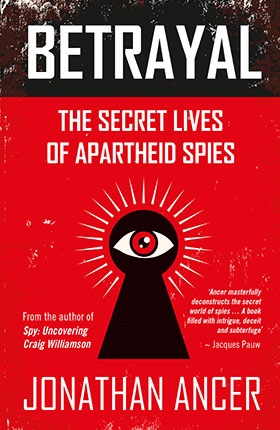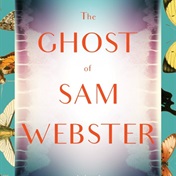
It was just another boring day in Cradock – sometime in January 1985, and about a month before I was going to start my university career at Rhodes University – when I received a phone call from "Mark".
He told me he was speaking to Journalism and Politics students about possible "opportunities". He said he could meet me at the Masonic Hotel bar in my hometown of Cradock to chat.
I was very excited about heading to university, and jumped at the chance to chat to someone about it. Anyway, he said he would buy me a beer!
When I met "Mark", he told me that he worked for a "government agency" that focused on "fighting communism". He said he was against racism and apartheid, but anti-communism.
Then he said to me that I could be part of an exciting, and well paid, project. All I had to do was go to meetings of the student left on campus and report back to him what was said. He added that, if I enjoyed the "work", I could become involved in more "adventurous stuff". They could also get me an exemption from ever having to do my "national service" in the SADF.
I'd be lying if I said that the offer of money and exemption from the army wasn't tempting, but even the young, politically naïve me didn't feel comfortable with his offer. I said I wasn't interested and we parted ways.
Soon after I arrived at Rhodes, I became politically involved. I joined the End Conscription Campaign (ECC), the National Union of South African Students (NUSAS) and the South African Student Press Union (SASPU) newspaper Rhodeo. I forgot all about "Mark". Then, one evening, I got called to the phone in my residence. At the other end of the line was "Mark", wanting to know if I had changed my mind. By this stage I was a lot less naïve and I told him to get lost.
Lieutenant Edwards
The next time I came face to face with "Mark" was when I was detained by the police for planting trees (yes, trees, not bombs) at a graveyard in Joza, the township outside white Grahamstown, as part of an ECC project with community leaders there.
I recognised my "interrogator" immediately. It was "Mark". Except this time he introduced himself as Lieutenant Lloyd Edwards of the Security Branch.
Lieutenant Edwards was the younger – slightly less vicious, much less charismatic, and less successful – brother of Captain Karl Edwards, one of the characters in Jonathan Ancer's latest book Betrayal: The Secret Lives of Apartheid Spies.
Ancer, whose first book, Spy: Uncovering Craig Williamson, dealt with possibly the most successful spy (and killer) of the apartheid government, delves deeper into the smoke-and-mirror stories of the apartheid regime's white spies, and a few who worked for the other side.
I wasn't the only one approached by Edwards to spy on their fellow students. In mid-1985, another first-year Gavin Roller came clean to NUSAS leadership that he had been recruited by him. He had been approached in exactly the same way as I had, and Edwards had made him the same offers of money, adventure, and exemption from conscription into the military.
Ancer describes in his book how NUSAS then decided to hold a public meeting on campus, where those who had accepted the offer of the Security Branch could come forward and "confess".
Lieutenant Forsyth
I attended that meeting. It was chaired by a new struggle hero of mine, comrade Olivia Forsyth. Or as Ancer describes her, "the most successful Rhodes spy of all, Lieutenant Forsyth".
At the meeting, a number of students confessed to being spies. Through their involvement in student politics, they had all come to see that the real evil was the apartheid regime and not their comrades who they had agreed to snitch on.
Lieutenant Forsyth was a real piece of work. As Ancer writes, it was she who drew up the pamphlet calling on students and academics to attend the meeting, and she "couldn't resist a Le Carre quip, titling the pamphlet Coming In From the Cold… Police Spies Reveal All".
Ancer says he wanted to "explore the triple themes of betrayal, repentance and forgiveness". What makes someone able to betray their friends/comrades, and can there be forgiveness for those "who are actually sorry"?
These are not easy questions to answer. The apartheid spies dealt with in Ancer's book display different "degrees of evil": from the absolute venality of unapologetic child murderer Williamson and Karl Edwards; to Forsyth, who despite her unconvincing attempts to paint herself as someone who had seen the light and switched sides, never said sorry (as Ancer concludes, she "has only ever been on one side: her own"); to Joy Harnden, who seemed to be genuinely remorseful for betraying her Joburg "comrades" in the UDF, ECC and Black Sash.
-
Then there is the case of apartheid cop and spy Gordon Brookbanks. Ancer tells the story of Andrew Borraine's son coming home from school one day and telling his dad that his History teacher had taught them how to toyi-toyi. Borraine, a leading anti-apartheid activist and later ANC leader, was horrified when he realised that the man teaching his son to toyi-toyi was one of his old enemies.
'Repentance demands introspection'
At first, Borraine wanted Brookbanks fired. Then he remembered that former MK cadre and now top Western Cape cop Jeremy Vearey had worked with his former enemy Brookbanks to bring about peace in the Western Cape during the early 1990s. In fact, the two men had become friends.
Ancer quotes Borraine as saying: "I thought, well, he's never hidden what he's done. He atoned in a way by carrying on working for the democratic government and, to some extent, turned over a new leaf… Some of the spies were just complete thugs, pathologically committed to violent behavior, but not everyone was like that. With Gordon there was an element of reconciliation."
Not all parents at the school reached the same closure as Borraine, however, there are some who still wanted him removed.
As Ancer correctly concludes, "forgiveness is the prerogative of the person who has been wronged. It can't be asked for: it can only be given".
"Repentance demands introspection, and this requires the spies to do something they are unfamiliar with: to tell the truth."
And there lies the problem in gaining any truth or "closure" about spies. Their job description is deceit, the weaving of cover stories, and the creation of smoke and mirrors.
* Betrayal: The Secret Lives of Apartheid Spies is written by Jonathan Ancer and published by NB Publishers.




 Publications
Publications
 Partners
Partners











